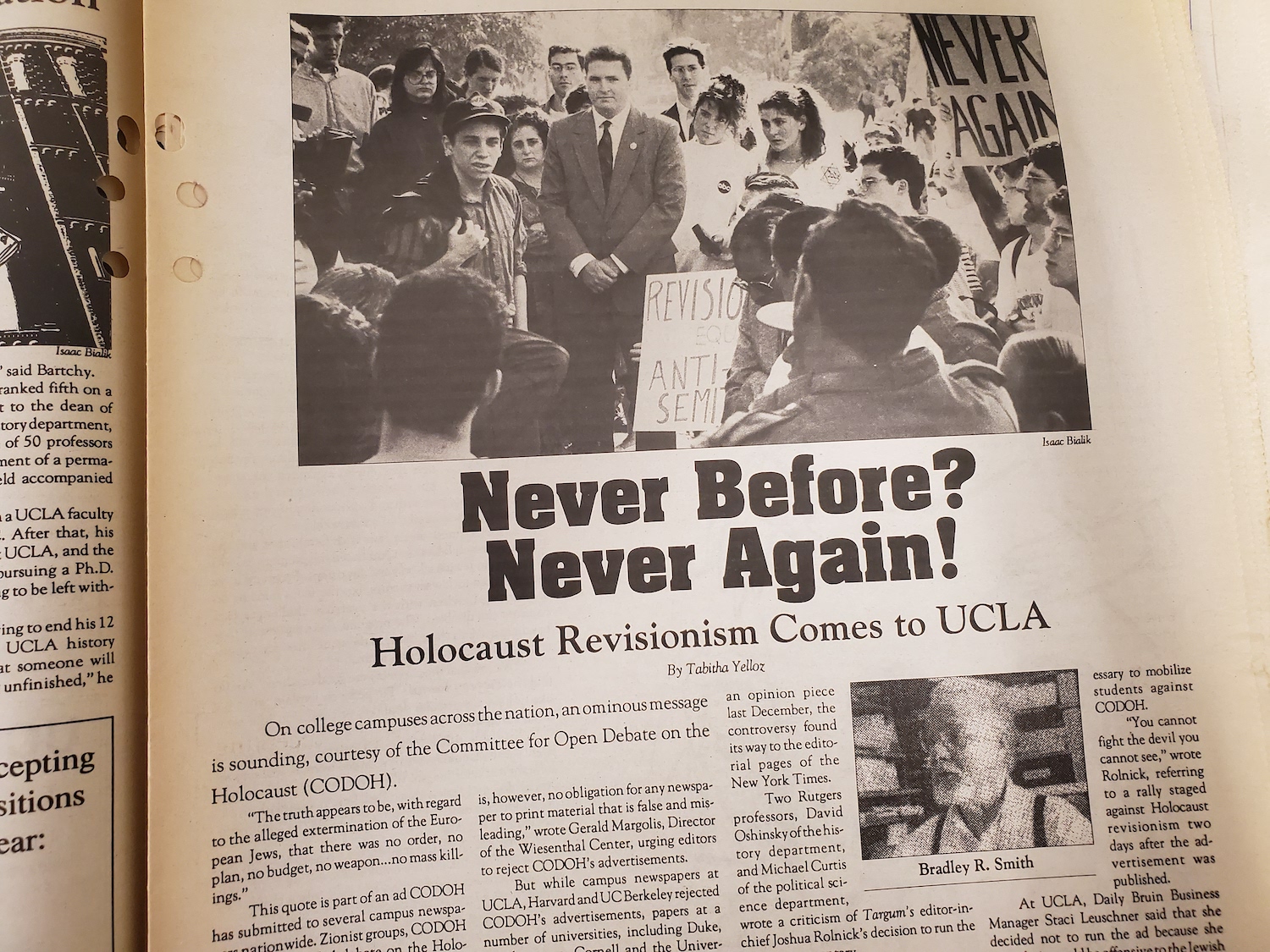This week’s Historical Ha’Am article was chosen because of its continued relevance. In a world where anti-Semitism continues to exist, it is essential that we remain committed to addressing those who seek to snuff our voices. Thus, we invite you to read an article from February of 1992 that is concerned with Holocaust revisionism and to reflect on what has since changed, what has not, and what still needs to.
“On college campuses across the nation, an ominous message is sounding, courtesy of the Committee for Open Debate on the Holocaust (CODOH).
‘The truth appears to be, with regard to the alleged extermination of the European Jews, that there was no order, no plan, no budget, no weapon… no mass killings.’
This quote is part of an ad CODOH has submitted to several campus newspapers nationwide. Zionist groups, CODOH argues, have stifled debate on the Holocaust in order to ‘drum up world sympathy’ for Jewish causes and for Israel. Because of this Jewish distortion of history, the world has wrongfully acknowledged the Holocaust’s existence, CODOH claims.
Messages such as these make up the core of CODOH’s nationwide advertising campaign, which targets major colleges and universities throughout America. The group seeks to foster ‘open debate’ on the veracity of the Holocaust, said David Cole, a member of CODOH who spoke last week at UCLA.
CODOH founder Bradley Smith and his group have worked their way across the nation, attempting to publish their findings in major university newspapers and convey them to any audience that will listen, said Jerry Shapiro of the Anti-Defamation League. In the process, they have stirred considerable controversy.
In early November last year, both the Anti-Defamation League and the Simon Wiesenthal Center for Holocaust Studies called on college newspaper editors to reject advertising which denies the reality of the Holocaust.
‘We are all, of course, concerned about First Amendment guarantees. There is, however, no obligation for any newspaper to print material that is false and misleading,’ wrote Gerald Margolis, Director of the Wiesenthal Center, urging editors to reject CODOH’s advertisements.
But while campus newspapers at UCLA, Harvard, and UC Berkeley rejected CODOH’s advertisements, papers at a number of universities, including Duke, Northwestern, Cornell and the University of Michigan, published them.
After the Rutgers Targum accepted and printed a CODOH advertisement as an opinion piece last December, the controversy found its way to the editorial pages of the New York Times.
Two Rutgers professors, David Oshinsky of the history department, and Michael Curtis of the political science department, wrote a criticism of Targum’s editor-in-chief Joshua Rolnick’s decision to run the ad as a commentary.
Rolnick responded to the professors’ criticism, arguing that publication was necessary to mobilize students against CODOH.
‘You cannot fight the devil you cannot see,’ wrote Rolnick, referring to a rally staged against Holocaust revisionism two days after the advertisement was published.
At UCLA, Daily Bruin Business Manager Staci Leuschner said that she decided not to run the ad because she thought it would be offensive to the Jewish community and she did not have enough time to consider other options.
‘An article like that shouldn’t be in the ad section, it should be in the Viewpoint section,’ Leuschner said. ‘I was concerned about the free speech issue, but I didn’t have time to get any other input.’
According to Shapiro, Smith chooses to focus on the college-aged audience because he sees their minds as ‘unformed’ and ‘empty vessels waiting to be filled.’
To help spread his views Smith founded CODOH and joined the Institute for Historical Review (IHR), an organization of revisionist historians.
Like CODOH’s, the views of the IHR have stirred up controversy. In 1985, author Mel Mermelstein sued IHR owner Willis Carto after he failed to make good on a promise to pay $50,000 to anyone who could prove the Holocaust occurred. In proving his case, Mermelstein had submitted sworn testimony from Auschwitz survivors.
California Superior Court Judge Thomas T. Johnson ruled that ‘the Holocaust is not reasonably subject to dispute,’ and awarded Mermelstein more than $90,000 in damages.
Because of the public spectacle caused by the lawsuit, Smith decided to separate himself from Carto and the IHR and form his own group, which in 1987 became CODOH, said Shapiro.
According to Shapiro, CODOH and similar organizations use such rhetoric as a cover-up for hate. ‘They consider themselves the other side of the story. [Their ads] represent new avenues for anti-Semitism, a desire to rehabilitate the Third Reich, and their idea that Jews invented the idea of the Holocaust,’ he said.
This strategy allows the calm, rational-sounding Smith to espouse his hate under the guise that his position is merely an ‘alternate view,’ Shapiro added.
This leads to the question of how to deal with hate groups, especially covert hate groups, such as CODOH. ‘You can’t ignore the cancer on the one hand,’ said Aaron Breitbart, the director of Simon Wiesenthal’s research department, ‘but on the other hand, you shouldn’t give them promotion.’”
-Tabitha Yelloz, February 1992

